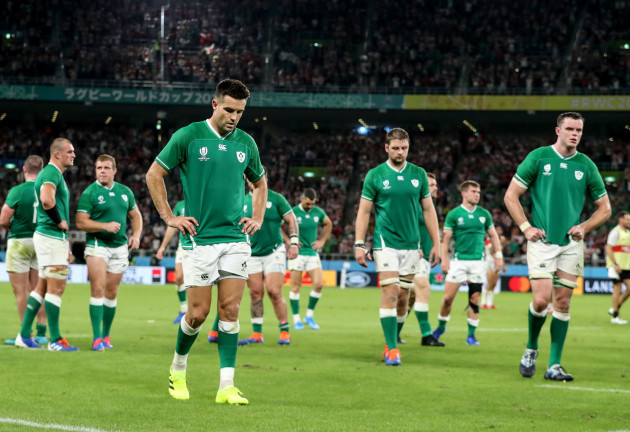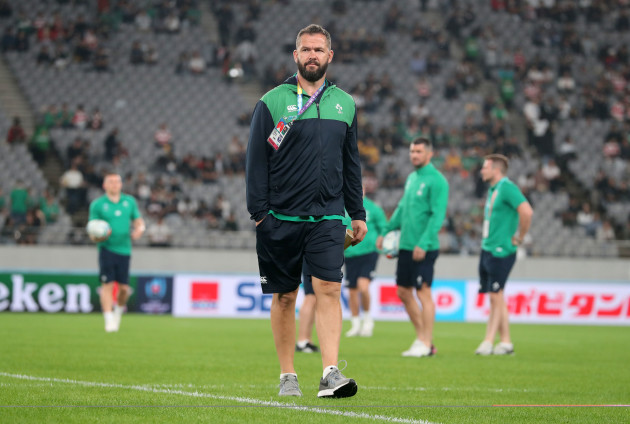IRFU PERFORMANCE DIRECTOR David Nucifora says the union’s review into Ireland’s poor performance at the 2019 World Cup has pinpointed a failure to develop their style of play, a lack of focus on hosts Japan, psychological shortcomings, and the need to continue developing Irish players’ skillsets as the key lessons.
Speaking at a media briefing in the Aviva Stadium this afternoon, Nucifora presented findings from the IRFU review that involved interviews with all players, coaches and management staff involved in Ireland’s World Cup campaign.
The process involved interviews with Joe Schmidt and his squad both before they left for Japan and after they returned following their heavy quarter-final defeat at the hands of New Zealand.
While Nucifora was keen to stress that the review was not going to lead to “throwing the baby out with the bathwater” and underlined much of what is good about Irish rugby, it also highlighted flaws in how Ireland approached the World Cup under Schmidt.
The team’s style of play is one aspect that could have been further developed after Ireland’s stunning 2018, when they won a Grand Slam, secured a series success in Australia, and beat the All Blacks in a November Test.
“There has been criticism that we should have been offloading more or counter-attacking more, not that our management don’t consider that – they consider everything,” said Nucifora.
“They’re like a risk assessor, looking at strength and weaknesses of personnel and of opposition, what the potential downsides are if I do this or don’t do it… all those things are thrown into the mix.
“Leading into the World Cup, post-Six Nations, all these things were assessed. The strength of this team over the years has been the strength clarity and certainty of how they play.
“Should we have developed our game further? Potentially yes, but I say that with the benefit of hindsight and our coaches have been good at those things for a long period of time.
“We could have gone down that path but there was no guarantee that would have got us a better result. It creates a risk. We chose the path of ‘let’s stick with what we do and try to get an extra 10 to 15%.’
“Should we have armed our players with more tools? In hindsight, we should have but that’s easy for me to say that sitting here now… it potentially could have really turned to custard for us. It’s a learning for us in terms of managing the future.”
Nucifora also said the psychological side of Ireland’s approach will need to be improved moving forward as Schmidt’s men struggled to deal with the mental challenge of being top dogs after 2018.
Ireland had a mental skills coach during Schmidt’s time in the shape of Enda McNulty but Nucifora said the IRFU feel this is something that can be improved.
“Performance anxiety or stress, I do believe it was really relevant for us before and during the tournament,” said Nucifora.
“At the end of 2018, we were now the front-runners and I’m still getting my head around that but you have to deal with that mentality of being a front-runner and handling pressure and expectation in that period of being the best.
“The bell curve started to drop on us during the Six Nations with some of our performances and straight away started to be a level of anxiety building up into the World Cup.
“Some of it doesn’t just manifest itself in players but also staff. You go into the world’s biggest competition and we probably underestimated the level of support we needed to give players and staff around that area to manage the expectation that was on them because of the level of success they had leading into that Six Nations.
“To be able to manage the stress and expectation of performance, I really do believe it’s an important area for us to look at and service better. The whole area of psychology has to be improved as well as health and wellbeing.
“If we continue to do well and manage to get ourselves back up to the top again or near the top, we need to be able to manage that better and drive performance better by supporting everyone better.”
Nucifora said that the IRFU review, which involved an independent consultant, also leads them to believe that Ireland didn’t focus on their clash with Japan from early enough.
Schmidt’s men opened with a big win over Scotland before facing the Japanese just six days later, and Nucifora said Ireland should have treated those two fixtures as a block of games.
“Our coaching approach during that time was for the lead-in to focus on the Scotland game and everything focused on it as it was perceived to be the biggest game of the group,” said Nucifora. “As we all know, we achieved that but we’ve all been asking the question – did we get it wrong in not doubling up?
“A six-day turnaround, how would people respond to dust themselves off after climbing the mountain to perform at the same level of enthusiasm against the home side who had nothing to lose whatsoever.
“And we underestimated the level of intensity Japan could produce for 80 minutes, it genuinely surprised it. We feel we got a few things wrong there and feel if we had our time again, our time would have been split more.
“It wasn’t that we were going to change our game strategy but just getting our mindset right for that game.
“Dropping that Japanese game, it sets a tone, sets a mood. That damaged us because there was more pressure on us in that regard to perform at the level we were able to perform at.”
Finally, Nucifora said the review had delved into the skill level of Irish players and the need for continual improvement in that area.
“It’s not something new,” said Nucifora. “It’s something we’ve worked on for the last few years, the onus is on us to keep working on our development pathway to make sure our players are able to play the game in multiple ways.
“That doesn’t just apply to our development pathway but also to our elite players. We will be a little more prescriptive in how we deliver that with the provinces.
“The fact is we have the ability to work closely between national and provincial coaches to bed things down because you don’t change habits over a week, it takes longer.
“Work is bedded down in the provinces, it’s nothing special, it has to be done year-round. We need to extend that into a number of areas, extend that into the skillset of our professional players as well as the players in the pathway.”
Nucifora also touched on his pleasure with how the provinces have been performing and delivering talented young players into the system, while he lauded the success of the 7s programme, and stressed his belief that the women’s 15s set-up is on the right track building towards their World Cup Qualifying competition in September 2020.



